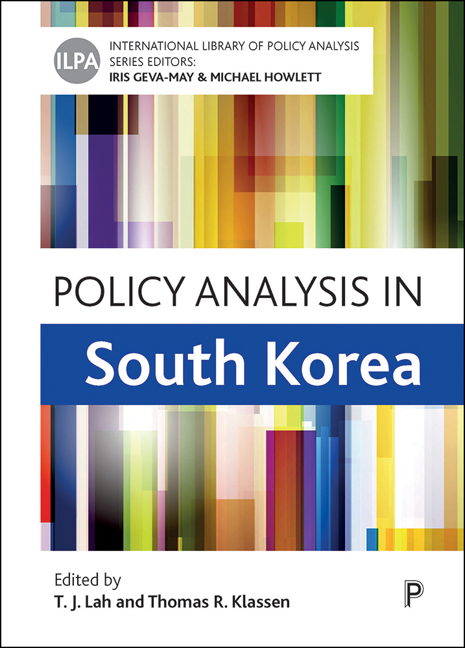Book contents
- Frontmatter
- Dedication
- Contents
- List of figures, tables and boxes
- List of abbreviations
- Notes on contributors
- Acknowledgements
- Editors’ introduction to the series
- Foreword
- Part One Overview of policy analysis in Korea
- Part Two Policy analysis by governments
- Part Three Committees, consultants, media, public inquiries and public opinion
- Part Four Parties, interest groups and advocacy-based policy analysis
- Part Five Academia, research institutes and policy analysis
- Index
fourteen - Policy analysis and labour movements in Korea
Published online by Cambridge University Press: 18 January 2024
- Frontmatter
- Dedication
- Contents
- List of figures, tables and boxes
- List of abbreviations
- Notes on contributors
- Acknowledgements
- Editors’ introduction to the series
- Foreword
- Part One Overview of policy analysis in Korea
- Part Two Policy analysis by governments
- Part Three Committees, consultants, media, public inquiries and public opinion
- Part Four Parties, interest groups and advocacy-based policy analysis
- Part Five Academia, research institutes and policy analysis
- Index
Summary
Introduction
A report by the International Labour Organization (ILO) (Ishikawa, 2003) noted that social dialogue in policymaking plays a fundamental role in advancing democracy, social justice and a competitive economy. The key role of social dialogue has also been noted by others (see Visser and Hemerijck, 1997; Rhodes, 2001; Baccaro, 2003; House and McGrath, 2004; Sarfati, 2006). This chapter investigates the role of labour movements in the policy process, with a focus on social dialogue in Korea. The policy process, including policymaking and analysis, cannot be adequately appreciated without an understanding of the institutional mechanisms of resistance and resilience, such as path-dependency or the ‘lock-in’ effects of historical legacies (Pierson, 1994, 2001).
However, the recent literature on neo-institutionalism highlights the capacity of strategic actors together with the role of ideas and discourse, which are central to politics (Schmidt, 2008; Mahoney and Thelen, 2010). This does not deny the salience of path-dependent effects, nor does it mean that institutional variables are of secondary importance. Instead, the policy process can be portrayed as a series of interactions between institutional configurations and strategic manoeuvring by political actors (Lee, 2008, 2014).
Strategic manoeuvring in the policy process has often been attributed to continual struggles and negotiations between forces ‘from above’ and ‘from below’. Prior to Korea's political democratisation in 1987, the policy process was dominated by conservative forces from above such as authoritarian political leaders, state elites and big businesses, with a lack of input from forces from below such as labour movements and civic organisations. In recent times, while those at the top still command significant resources that remain as institutional legacies of the authoritarian developmental state, those at the bottom have gained increasing influence, especially after Korea's first democratic transition of power in 1997 (Ringen et al, 2011; Lee and Kim, 2019). Social dialogue institutions in Korea can be seen as a strategic playing field where the traditionally influential forces from above and newly emerged forces from below interact to articulate their interests and ideas.
This chapter begins by highlighting the legacies of Korea's authoritarian developmental state, which are embedded in both industrial relations and the policy process. This is followed by an examination of the evolution of social dialogue institutions after the political democratisation of 1987 and the Asian financial crisis of 1997. The concluding section discusses the challenges for the Korean labour movement in future policymaking.
- Type
- Chapter
- Information
- Policy Analysis in South Korea , pp. 211 - 224Publisher: Bristol University PressPrint publication year: 2023

